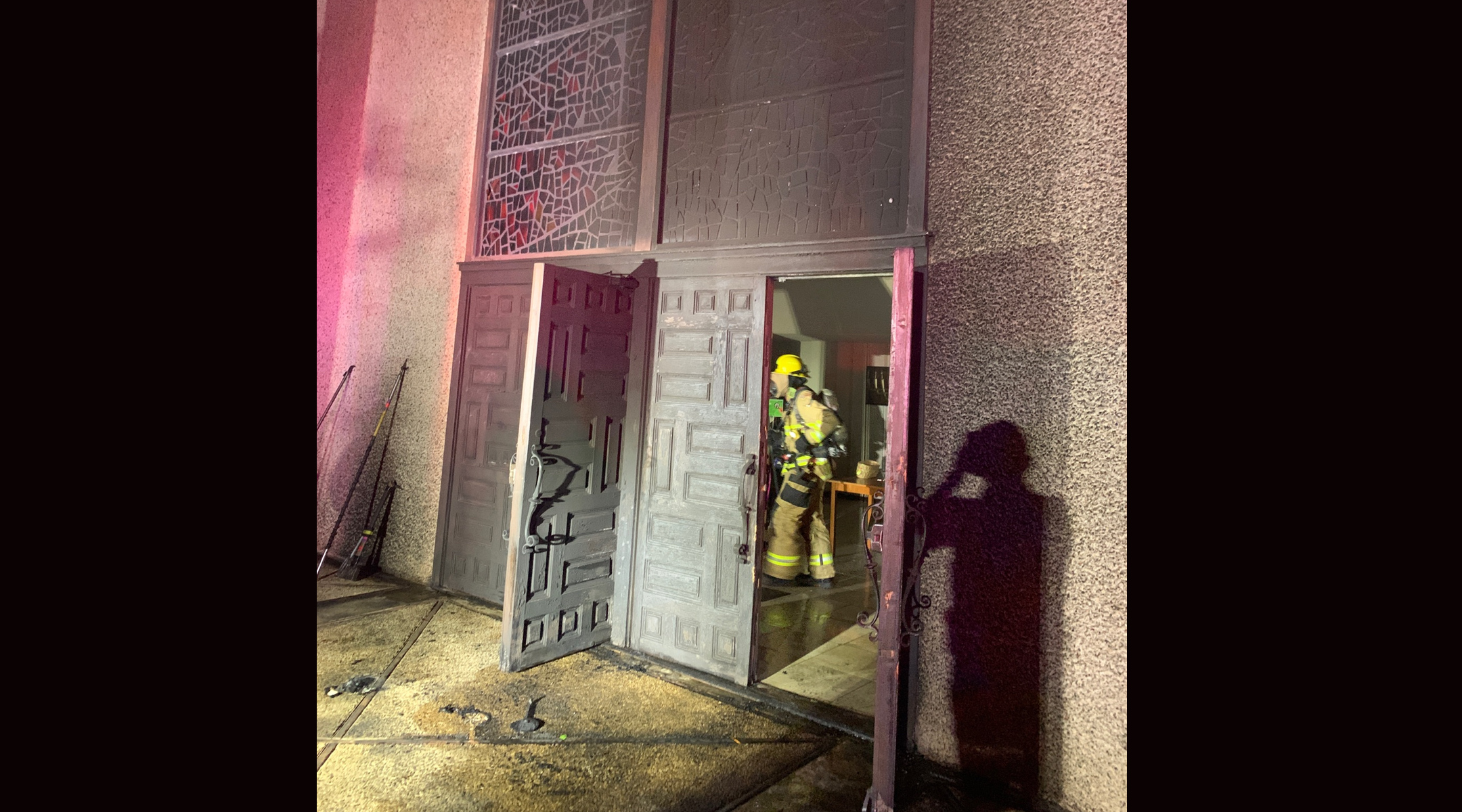Austin synagogue arsonist sentenced to 10 years in prison
The arson took place in 2021; Franklin Sechriest admitted his guilt earlier this year

A fire at Congregation Beth Israel in Austin, Texas set on Sunday, Oct. 31, 2021 damaged the sanctuary, historic front doors and stained glass windows at the Reform synagogue. (Austin Fire Department)
(JTA) – A man who pleaded guilty to setting fire to a synagogue in Austin, Texas, in 2021 was sentenced on Wednesday to 10 years in prison.
The sentencing of Franklin Sechriest came after a series of victim impact statements from members of Congregation Beth Israel, a Reform synagogue. Normal federal sentencing guidelines call for a five-year prison term, but prosecutors asked U.S. District Judge David Ezra to sentence Sechriest to 10 years due to what they said was the “tremendous damage” he caused and his “deep-seated hatred of persons of the Jewish faith.”
Sechriest pleaded guilty in April to two federal charges, including the destruction of religious property, which is classified as a hate crime. He admitted to setting a fire in October 2021 that damaged the sanctuary’s historic front doors and stained glass windows, causing around $250,000 worth of damage. Investigators found antisemitic and racist material as well as bomb-making supplies in his car, and journals filled with hate speech in which he had written, “I set a synagogue on fire.”
“It was a solemn and sad day,” Jake Cohen, Beth Israel’s executive director, told the Jewish Telegraphic Agency. “No one wanted to be in this moment, be in this place. And yet we are grateful to the judge, Judge Ezra, for his thoughtful deliberation, for his respectful, kind, empathic words to our community.”
Cohen said the sentencing carried extra weight coming amid a charged national climate around antisemitism. Law enforcement and Jewish groups have reported a rise in antisemitic incidents, and multiple Jewish institutions have been targeted by vandalism, bomb threats and other criminal behavior in the wake of Hamas’ Oct. 7 attack in Israel and Israel’s subsequent war against the terror group in Gaza.
“Across the country right now, all Jewish communities are on heightened alert due to rising antisemitism,” Cohen said, adding that the congregation had received a robocall from the Ku Klux Klan mere weeks ago. “Everyone feels the anxiety and questions whether hate can come to our doorstep.”
The fire came amid a spate of antisemitic incidents in Austin organized by the Goyim Defense League, a white supremacist group that holds antisemitic rallies and distributes literature promoting hatred of Jews. The group, which the Anti-Defamation League said was responsible for nearly 500 antisemitic incidents in 2022, had hung a banner reading “Vax the Jews” from an Austin bridge in the days before the synagogue fire and streamed a swastika-burning event shortly afterwards. The group’s founder told the Daily Beast that Sechriest was not associated with the Goyim Defense League.
The congregation’s board of directors supported giving Sechriest a plea deal.
Daniel Wannamaker, Sechriest’s attorney, told JTA that his client had already spent two years in county jail and would get credit for that time. Sechriest has waived his right to an appeal.
“It’s a tough case because it’s a heinous crime,” Wannamaker said, adding that he believed Sechriest, who has autism, had been influenced by a hate group online.
In court filings asking for a delay in the hearing, Wannamaker had said that his client suffers from “several mental and emotional conditions” and would need more time to process the significance of his sentencing. The judge denied his request.
“He’s on the spectrum and he just kind of fell into the trap of finding people on the Internet who I think just took advantage of his condition,” the attorney told JTA. “They groomed him and had him commit these acts. But he’s guilty, he accepted his responsibility, and now we just want him to get help, which he should be able to get in a federal facility that deals with mental health issues.”
Since the arson attack, Beth Israel has turned its social hall into a new prayer space, which it inaugurated during the High Holidays this year. Next week the synagogue will hold a “visioning process” to figure out whether to rehab the damaged prayer space or explore other options including relocating the congregation entirely. Whatever the synagogue decides, Cohen said, “it’s going to cost millions of dollars,” and leaders plan to launch a capital campaign. The congregation also recently commemorated two years since the arson.
“We’re going to do what Jews do and make lemonade from a really painful situation,” Cohen said.
The new space includes a Ner Tamid, or eternal flame, constructed from bits of the fire-damaged stained glass.
This article originally appeared on JTA.org.
A message from our Publisher & CEO Rachel Fishman Feddersen

I hope you appreciated this article. Before you go, I’d like to ask you to please support the Forward’s award-winning, nonprofit journalism so that we can be prepared for whatever news 2025 brings.
At a time when other newsrooms are closing or cutting back, the Forward has removed its paywall and invested additional resources to report on the ground from Israel and around the U.S. on the impact of the war, rising antisemitism and polarized discourse.
Readers like you make it all possible. Support our work by becoming a Forward Member and connect with our journalism and your community.
— Rachel Fishman Feddersen, Publisher and CEO


























